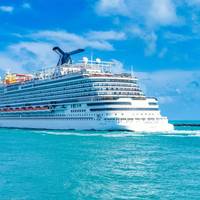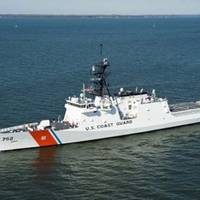US Grants LNG Shipping Waiver for Puerto Rico after Hurricane

The Biden administration late on Sunday approved a waiver of U.S. shipping rules to address Puerto Rico's urgent need for liquefied natural gas (LNG) after Hurricane Fiona. The Homeland Security Department (DHS) issued a waiver of the Jones Act, a century-old law that requires goods moved between U.S. ports to be carried by U.S.-flagged ships "to address Puerto Rico’s needs as recovery efforts from Hurricane Fiona continue," the department said. In late September, the DHS approved…
CDC Relaxes Rules for Cruise Ship Passengers

The Centers for Disease Control and Prevention (CDC) said on Saturday that unvaccinated foreign nationals under the age of 18 traveling to the United States by air do not have to self-quarantine upon arrival.CDC Director Rochelle Walensky on Saturday signed a revised order clarifying that foreign national children who have not been vaccinated against COVID-19 do not need to isolate for seven days upon arrival in the United States.A CDC order issued on Monday had raised alarm among some foreign travelers that their children would need to quarantine for that long after arriving.On November 8…
Biden Introduces Buttigieg as Transportation Secretary

President-elect Joe Biden touted the diversity of his incoming administration as he introduced former rival Pete Buttigieg on Wednesday as his choice for U.S. transportation secretary.Buttigieg, the former mayor of South Bend, Indiana, would be the first openly gay Cabinet secretary confirmed by the Senate if he is approved.Appearing with Buttigieg in Wilmington, Delaware, Biden said the 38-year-old would confront the task of upgrading America’s aging infrastructure and restoring what he called “our crumbling roads…
Maritime Industry's Slow Boat to Cyber Security

Ports making up for lost timeDespite the critical role the maritime transportation system plays in the economic health of the United States, and despite its fairly recent embrace of all things automated – cranes, vehicles, surveillance and even vessels – the sector has been slow to warm to the need to protect its digital systems and assets.Post 9/11, security concerns about the nation’s borders, air space and infrastructure, including ports, moved front and center for a brief moment before other concerns…
Phillips 66 Charters Foreign Tanker for Domestic Voyage
Phillips 66 has chartered a Marshall Islands-flagged vessel, making use of a temporary waiver of the Jones Act that was put in place to meet fuel shortages in the wake of hurricanes Harvey and Irma, Argus Media reported on Thursday. The vessel, Nave Jupiter, departed from Houston, Texas on Sept. 9, and was docked near the company's Alliance refinery in Louisiana, the report said. The nearly 100 year-old law mandates the use of U.S.-flagged vessels to transport merchandise between U.S. coasts. Last week, the U.S. Homeland Security Department had waived the law for a week, the first such waiver since December 2012 after Hurricane Sandy. The department said earlier this week that it was extending the temporary waiver until Sept. 22.
USCG Contracts HII to Build Sixth National Security Cutter

The U.S. Coast Guard awarded a fixed‐price incentive firm target contract valued at approximately $487.1 million to Huntington Ingalls Industries for the production of the sixth National Security Cutter (NSC). NSC 6 will be built at Huntington Ingalls Industries’ (HII) shipyard in Pascagoula, Miss. Two NSCs are currently in production. The Coast Guard awarded the production contract for NSC 4 in November 2010 and production of that vessel is approximately 39% complete to date. The Coast Guard awarded production for NSC 5 in September 2011. NSC 5 is approximately 16% complete to date.
Ship-Tracking Satellite Launched
The U.S. Coast Guard announced the launch of an Orbcomm satellite in an initiative to increase maritime situational awareness and security. The launch of the Orbcomm satellite is part of the Coast Guard and Homeland Security Department's Nationwide Automatic Identification System project. The satellite, launched from , , was equipped with automatic identification system technology capable of tracking and identifying ships as far as 2,000 nautical miles from coastlines, the Coast Guard reported. Officials expect the Orbcomm satellite will begin transmitting operational data within the next three months and will then improve maritime domain awareness and provide increased security to coastal waters from potential threats. Source: UPI
Adm. Natter to Pass Command of U.S. Fleet Forces Command, Atlantic Fleet

Official U.S. Navy file photo of Commander, U.S. Atlantic Fleet Adm. Robert J. Natter, visiting with Sailors and Marines attached to Camp Patriot, Kuwait. Natter will relinquish command of Fleet Forces Command and U.S. Atlantic Fleet to Adm. William J. Fallon, in an Oct. 3 ceremony aboard USS Theodore Roosevelt (CVN 71). Adm. Robert J. Natter will relinquish command of the Navy’s Fleet Forces Command and U.S. Atlantic Fleet to Adm. William J. Fallon in a ceremony to be held aboard the aircraft carrier USS Theodore Roosevelt (CVN 71) here Oct.
NY Senator Calls for Enhanced Security
Senator Schumer is calling for the installation of screening for persons disembarking from passenger ships in New York City. He wants the US-VISIT program to be instituted for such ships, including use of “fingerscanners”. US Senator Charles E. Schumer revealed that while Federal officials are pushing to close Madison Square Garden and the James A. Farley Post Office during the summer's Republican National Convention, they refuse to install their highly-touted new "fingerscanners" at Manhattan's Passenger Ship Terminal to check foreign visitors against terrorist watch lists, even though the Terminal is jut blocks away from the Convention.
Will the USCG be Properly Funded?
The White House has embarked on a full-scale effort to sell the new federal cabinet level Department of Homeland Security. While the Congress does not seem to oppose the creation of the new department, they will no doubt reshape the make up as the project works its way through the system. Once the Congress starts adding and subtracting from what will go into the agency the process will become quite unpredictable. The stated purpose of the new agency would be to be the repository or clearinghouse of all domestic terrorism intelligence, merging some 22 agencies with 170,000 employees. At first blush it would appear the agency would be driven by the US Customs and Secret Service [both from Treasury] and the Transportation Security Agency [from Transportation (DOT)].
Editor's Note
At press time, the political debate surrounding the creation and final details of the Homeland Security Department was still being vehemently debated, rightfully so considering that it is perhaps the most significant U.S. government overhaul in nearly half a century. Those hoping for a clean and quick decision on the matter should have known that politics — and time — would eventually cool the fervor created by the September 11 attack. This is not to say that safety and security is no longer a top priority ... quite the opposite in fact. The marine business in and around the U.S. has been under intense scrutiny since 9/11, with measures…
Texas Gov. Authorizes Creation of Houston Ship Channel Security District
Texas Gov. Rick Perry signs House Bill 3011, authorizing creation of the authorizing creation of the Houston Ship Channel Security District. Texas Gov. Rick Perry signed into law House Bill 3011, authorizing creation of the Houston Ship Channel Security District -- the nation's first of its kind and modeled after a management district. The signing took place at the Port of Houston Authority Executive Office Building. The Texas Legislature, in its 80th biannual session, authorized the creation of the Houston Ship Channel Security District -- an entity, proponents hope, that will serve as a security model for ports throughout the United States.
Bush Budget Boon to Shipyard
Shipbuilding in Pascagoula would gain, but big farms in the Delta would lose under President Bush's $2.9b budget proposal for next year. Released Monday, the budget recommends spending $168m to expand the Strategic Petroleum Reserve, a series of underground salt caverns along the Gulf of Mexico that store millions of gallons of oil to be used in emergencies. The Energy Department has identified the salt caverns near Richton as the preferred site to increase the reserve's storage of oil from 691 million barrels to 1.5 billion barrels. The reserve was tapped in 2005 for more than 20 million barrels of oil to respond to shortages and price spikes following Hurricane Katrina.
Report: New Port-Security Law Sidesteps Dirty-Bomb Screening Overseas
Bloomberg reported that President George W. Bush will sign a port-security law that doesn't address what security experts and U.S. lawmakers fear the most: terrorists placing a nuclear or ``dirty'' bomb in a shipping container and detonating it upon arrival in the U.S. The law, passed by Congress on Sept. 29 with bipartisan support, requires incoming cargo at the 22 largest U.S. ports to be scanned upon arrival by the end of next year. Industry officials say the only protection against an in-port attack before scanning is to check containers while they're still overseas -- a massive undertaking, given that 12 million containers are shipped to the U.S. every year from 704 ports in 147 countries.
Gov't to Fund Port of Charleston Project
According to The State, the Port of Charleston will get $11.5m for the next 12 months for a port security project. The U.S. Department of Justice is providing the money to operate Project Seahawk. Earlier this year, Congress passed legislation with a provision by U.S. Sen. Lindsey Graham and others to use the Charleston operation as a model for others in U.S. port cities. These Seahawk Centers would be run by the Coast Guard and include the Department of Homeland Security, Department of Defense, Department of Justice, and other federal agencies. State and local law enforcement, first responders, port authority or maritime exchange representatives also would be included in the joint operations. Source: The State
House Passes Port Security Legislation
The House of Representatives passed legislation today that would tighten security at U.S. seaports, requiring more ``dirty'' and nuclear bomb detectors and background checks on dockside workers. Under the measure, which was approved 421-2, the Homeland Security Department would have to put in place enough radiation monitors to scan 98 percent of the cargo coming into the U.S. by the end of the next fiscal year, which is Sept. 30, 2007. With House passage, the focus of the port-security debate turns to the Senate, which plans to consider a similar measure within the next few months. The Bush administration is generally supportive of the legislation, although it thinks the deadline for installing detectors is overly ambitious.
DHS Call for Biometric ID Proposals
After three years of little movement, the plan to furnish transportation workers with biometric ID cards is suddenly on the fast track, Washington Technology reported. The Homeland Security Department in May will solicit proposals for widespread deployment and make an award in July. But concerns remain about how the program, known as the Transportation Workers Identification Credential, will be funded and structured. Several large federal contractors, including BearingPoint of McLean, Va. and Lockheed Martin Corp., have confirmed they are interested in bidding for the fourth phase of the contract, which is production and deployment of cards for 850,000 port workers nationwide.
Panel Rejects Port Security Proposal
Republicans on the House Homeland Security Economic Security Subcommittee on March 30 rejected a proposal from Democrats that would have required all cargo containers headed for the United States to have tamper-resistant seals and be scanned for illicit materials. The proposal, offered as an amendment to the Security and Accountability for Every Port bill, was defeated on an 8-6 party-line vote before the subcommittee passed the bill by unanimous voice vote. The defeated amendment would have required the Homeland Security Department to issue new regulations within three years requiring all containers to have hardened seals and be scanned before leaving a foreign port.
House Panel Postpones Homeland Security Bill Discussion
Republicans on the House Homeland Security Committee have postponed work on the fiscal 2007 Homeland Security Department authorization bill, prompting heated criticism from Democrats who say the move might undermine the committee's credibility and prevent the measure from being completed this year. According to a committee aide, Republican committee leaders say the delay is temporary while they work to pass a maritime security bill. All 15 Democrats on the panel fired off a letter Thursday to Homeland Security Chairman Rep. Peter King, R-N.Y., opposing the move. The committee did the first-ever authorization bill for Homeland Security last year, which overwhelmingly passed out of the House by a 424-4 vote.
Port Security Questions Remain
According to the Homeland Security Department, between 2004 and 2007 it will have spent $10 billion on maritime security investments. However, industry and government officials say much remains to be done. One of the key concerns remains the Transportation Workers Identification Card, a program to provide a single biometric credential to be used at U.S. seaports, allowing transportation workers and seaport users to get just one security clearance and to be checked against terrorism databases anywhere nationwide. Begun in 2003 in a pilot effort, the program has been repeatedly delayed and has experienced cost overruns. Regulations for the program were initially due in 2004, but now are not likely until late in 2006.
Gordon England Resigns as Navy Secretary
Acting Deputy Defense Secretary Gordon England has relinquished his post as secretary of the Navy, Defense Department officials announced Dec. 29. He will continue to serve as acting deputy secretary of defense, officials said. England has served as Defense Secretary Donald H. Rumsfeld's deputy since May, when former Deputy Defense Secretary Paul Wolfowitz left the Pentagon to head up the World Bank. Over two terms as Navy secretary, England served a total of 48 months. His terms were separated by his service as the first deputy secretary of the Homeland Security Department. For the past eight months, he has served in both the Navy post and as acting deputy secretary of defense. Navy Undersecretary Dionel M. Aviles will serve as acting Navy secretary effective today.
Raytheon Markets Maritime Defense System
The Globe is reporting that the cargo ship bears the name Osama. It's been registered in Syria. And it's steaming toward Los Angeles. That's the mock scenario playing out on a bank of giant plasma screens lined up for a demo here at Raytheon Co.'s Naval Integration Center on Narragansett Bay. The vessel has been tagged as suspicious based on data culled from shipping records. Raytheon engineers are using software to track its course. And they're combing databases tracing its history, ownership, and sister ships heading for US waters. Athena is part of a larger push by Raytheon, the nation's fifth-largest military contractor, into homeland security.
Port Security Bill Passes House
The House of Representatives passed the Security and Accountability For Every 'SAFE' Port Act. The legislation is a comprehensive, bipartisan port security bill that will enhance security at United States ports, track and protect containers en route to the United States, and prevent threats from reaching U.S. soil. It would provide $7.4b in spending on new port-security inspectors, nuclear-weapons screening and the development of an automated system to pinpoint high-risk cargo. With an additional $7.4b over the next five years, the legislation would bolster the Homeland Security Department's existing Domestic Nuclear Detection Office, requiring the deployment of nuclear- and radiological-detection systems to all domestic seaports.







